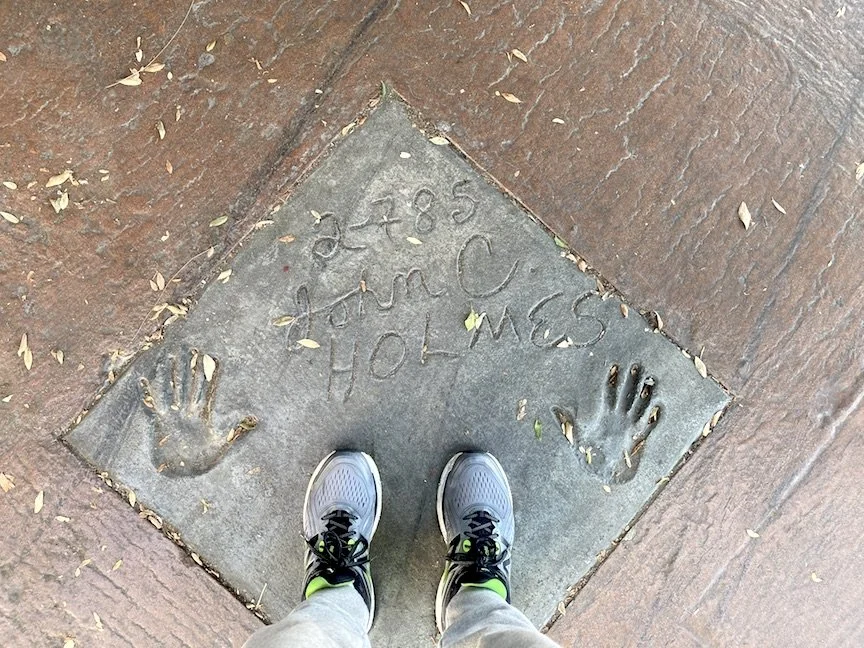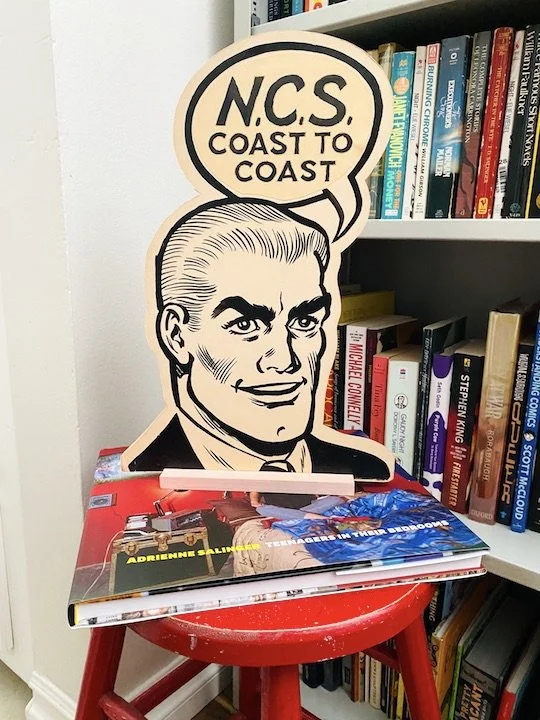Filtering by Tag: MEN
What I'm (Looking Forward to) Watching: Afternoons of Solitude
The Most Dangerous Game
About | Consulting I Email
Why Every (Successful) CEO Should Write a Book
“The problem wasn’t his story. It was him.” An excerpt from The Fixer Code on why you should write a book.
About I My Book I Newsletter I X I Instagram I LinkedIn I Consulting I Email
What I'm (Re)Watching: American Psycho
About I My Book I Newsletter I X I Instagram I LinkedIn I Consulting I Email
What Tripp Towers Wanted
“In July of 2023, I found myself standing in John Holmes’ footprints.” Read my latest newsletter and subscribe.
About I My Book I Newsletter I X I Instagram I LinkedIn I Consulting I Email
Thanks, Mell
Yesterday I went to an estate sale at the home of Mell Lazarus and bought this cartoonist conference standee.
About I My Book I Newsletter I X I Instagram I LinkedIn I Consulting I Email
The Storm
“Outside, there was lightning, but no thunder.” On my website, I republished a fictional short story I wrote years ago that was originally published by Contrary in 2016: “Storm Clouds Over the State of Louisiana.”
About I My Book I Newsletter I X I Instagram I LinkedIn I Consulting I Email
What I'm Watching: Almost Perfect
About I My Book I Newsletter I X I Instagram I LinkedIn I Consulting I Email
What I'm (Re)Watching: "Apocalypse Now"
About I My Book I Newsletter I X I Instagram I LinkedIn I Consulting I Email
The Zombie
A zombie on an adult movie set in the San Fernando Valley. For more of my photos, follow me on Instagram.
About I Book I Newsletter I X I Instagram I LinkedIn I Consulting I Email
Triptych (Girls & Boys)
A Van Nuys estate sale, fake John Cena, and Crazy Girls. For more of my photographs, follow me on Instagram.
About I My Book I Newsletter I X I Instagram I LinkedIn I Consulting I Email
Quote of the Day: Picasso (Vague)
About I My Book I Newsletter I X I Instagram I LinkedIn I Consulting I Email
What I'm Listening to: The English Beat's "Mirror in the Bathroom"
About I My Book I Newsletter I X I Instagram I LinkedIn I Consulting I Email
I Get Email (Perfect in Romance)
Over a decade ago, I wrote about the hardest thing about being a male porn star for Forbes.com. Since then, I’ve received over 1,000 emails from aspiring woodsmen. This one claims he is “perfect in romance.” [More]
About I My Book I Newsletter I X I Instagram I LinkedIn I Consulting I Email
What I'm Watching (Drowning)
About I My Book I Newsletter I X I Instagram I LinkedIn I Consulting I Email
Books I Read: Paying for It
The first time I read Chester Brown’s Paying for It was around the time it was originally published, I believe. I decided to buy a new copy and reread it when I heard that the woman who had been Brown’s “last girlfriend” before he started paying for it had directed a movie adaptation of the book. I seem to remember liking the book more the first time I read it. This time I found it kind of grim and sort of ick. I write about a fair amount of stuff related to this subject matter, and I even ran a website for a year where I posted anonymous emails men wrote to me about paying for it, but this comic is so dark and weirdly dissociated and lacking in any kind of empathy that I read it faster than usual just to get it over with. If you don’t know anything about paying for it or why guys pay for it or the politics of paying for it (particularly in Canada, Brown’s country of origin), this book may be of interest. Also, the drawings are cool. But to the Brown on these pages, sex workers are receptacles to be judged, used, and discarded. That take is retrograde, boring, and depressing.
About I My Book I Newsletter I X I Instagram I LinkedIn I Consulting I Email
Books I Read in 2024: Confessions of a Serial Killer
If you’re looking to get into the mind of the serial killer BTK, aka Dennis Rader, Confession of a Serial Killer: The Untold Story of Dennis Rader, the BTK Killer by Katherine Ramsland is one way to do it. Filled with communications between Rader and Ramsland, this book delivers an avalanche of detail about Rader’s crimes, offers hypotheses about what drove him to murder, and reveals what the layman and law enforcement can learn about people like him so as to better avoid/hunt them. This book is grim! You may have nightmares.
Books I Read in 2024: Victory Parade, I Hate Men, My Friend Dahmer, The Crying of Lot 49, Machines in the Head, Big Magic, The Valley, End of Active Service, An Honest Woman, The Money Shot, Atomic Habits, Finding Your Own North Star, Crazy Cock, Sigrid Rides, Your Money Or Your Life, The Big Sleep, Eventually Everything Connects, Smutcutter, Shine Shine Shine, A Serial Killer’s Daughter, Confessions of a Serial Killer
About | My Book I Newsletter I X I Instagram I LinkedIn I Consulting I Email
Books I Read in 2024: The Big Sleep
I decided to read The Big Sleep because one of the books I’m writing is a thriller. Generally speaking, this book is not for me. Hardboiled. High drama. Plot heavy. Tough guys and troubled dames. That said, I enjoyed some aspects of it: the literary flourishes, the narrative tension, the obsession with other people’s thumbs.
Books I Read in 2024: Victory Parade, I Hate Men, My Friend Dahmer, The Crying of Lot 49, Machines in the Head, Big Magic, The Valley, End of Active Service, An Honest Woman, The Money Shot, Atomic Habits, Finding Your Own North Star, Crazy Cock, Sigrid Rides, Your Money Or Your Life, The Big Sleep, Eventually Everything Connects, Smutcutter, Shine Shine Shine, A Serial Killer’s Daughter, Confessions of a Serial Killer
About | My Book I Newsletter I X I Instagram I LinkedIn I Consulting I Email
A Tour Of Graceland Reveals Elvis Presley Was The King Of A Curious Domain
This story was originally published on Forbes.com in September 2017.
If you find yourself in Memphis, Tennessee, you pretty much have to tour Graceland, the nearly 14-acre pastoral estate once inhabited by Elvis Presley, the King of Rock and Roll. The residence isn't far from downtown, and sits on a regular road. Across the street from the home, there's a massive complex devoted to all things Presley. But what's curious about taking a stroll around the grounds is that it's less like touring the opulent domain of a once glorified musician and more like taking a deep dive into the abode of a man obsessed with reflections and concealments. At a certain point, in Graceland itself, you might find yourself on a short flight of stairs descending to a basement, and you'll look around yourself to see mirrors have been mounted on the walls and the ceiling, and as you gaze at a vision of yourself reflected back at you, you'll wonder why a man who was adored by so many built a world of his own that was a literal funhouse hall of mirrors.
Before you make your way to Graceland proper and after you plunk down $57.50 (for $5 more, you can tour the airplanes—and how can you not tour the airplanes?), you enter Elvis Presley's Memphis, which is located across the street from Graceland. It is a sprawling complex of Stores That Sell Things Related to Elvis, Museums Devoted to Things Related to Elvis, and Restaurants That Sell Foods That Are Related to Elvis. But before you make your way through it, you are funneled into a room to watch a movie that celebrates The King. When that ends, you are shuttled into a shuttle that meanders and winds its way down and around and across the street to Graceland. There, you wait in line while groups of Elvis Fans and People Interested in Elvis line up to enter the Colonial Revival white and stone mansion. Finally, you enter The House Where Elvis Lived. At which point, you will likely turn to your right and see the peacocks.
This is the music room. Graceland consists of over 17,000 square feet of residence and contains 23 rooms, but the glowing gold of the peacock room is among the most impressive. Simply put, it is incredibly outrageous. Who would put massive stained glass peacocks in their front room? Elvis, that's who. From the start, it's clear that we're not in Kansas anymore, and Toto has left the room.
Being at Graceland makes one—or at least made this one—feel uneasy. Every room is decorated in some outrageous fashion. In the basement, there's a wall embedded with television sets. A retro surveillance camera lurks on a perch. Bizarrely, the billiards room is hung from walls to ceiling with a busily patterned pleated fabric. No one is allowed upstairs to the second floor, which purportedly remains untouched since Elvis died in an upstairs bathroom. In this stuck-in-time place, life is forever frozen, and it's unclear if you are the voyeur or under a microscope.
Arguably, the most outrageous room at Graceland is the den. It is known as "The Jungle Room." The green shag carpet is designed to resemble thick grass. The furniture is made of heavy wood and upholstered in what looks like fur. The red glowing wall where a fireplace would go in the average suburban home features a gently burbling waterfall. The effect is deeply 1970s Polynesian.
One doesn't typically associate Elvis with racquetball, yet if one stumbles from the disconcerting time capsule that is Graceland and strolls about behind the main house, one can peek inside a series of buildings, one of which contains the newly restored racquetball court. According to the Graceland website, one of Elvis's favorite past times was playing racquetball. The Memphis Flyer reveals that Elvis was part of a "racquetball mafia," and the King was no slouch at the game: "Elvis walloped the ball around the court like he was strumming a guitar for the fun of it."
Technically speaking, Elvis still resides at Graceland. He is buried, alongside several family members, in what's called the Meditation Garden. "He became a living legend in his own time, earning the respect and love of millions," his grave marker reads. "God saw that he needed some rest and called him home to be with Him." Tour takers stand nearby, taking pictures of the fallen king.
After touring Graceland, you will be shuttled back across the street. Behold Elvis's plane collection. It includes The Lisa Marie, a Convair 880 jet. "On April 17, 1975, Elvis bought a Convair 880 Jet, recently taken out of service by Delta Airlines, for the then-substantial sum of $250,000," Elvis Australia reports. "After refurbishing, the total exceeded $600,000."
This past March, Graceland opened Elvis Presley's Memphis at Graceland, a $45 million, 200,000-square-foot entertainment complex that includes the Elvis the Entertainer Career Museum, the Presley Motors Automobile Museum, and Elvis Discovery Exhibits. There are white bedazzled jumpsuits. There is a 1955 pink Cadillac Fleetwood. Down the street, Elvis Presley Enterprises spent $90 million to build The Guest House at Graceland to host a few of the 600,000 annual guests Graceland, including those who can afford up to $1,500 a night for a room.
At Gladys' Diner, I ordered the peanut butter and banana sandwich, which was, the sign said, fried in "bacon grease." Frankly, while I had been optimistic about the sandwich, it didn't look like much. I don't know if I spent too much time photographing the sandwich for Instagram, but by the time I bit into it, it wasn't very appetizing. This sandwich was a favorite of the King. It is known as "an Elvis sandwich" or "The Elvis."
By the time I left Graceland, the parking lot was filling, and the fans were funneling in for their turn at the Elvis experience. Personally, my Elvis experience left me feeling uneasy. What was the point of becoming so famous and so beloved if it prompted you to build a house in which most surfaces were reflective? In the end, the king stood alone, surrounded by his mirror image.
About | My Book I Newsletter I X I Instagram I LinkedIn I Consulting I Email




















